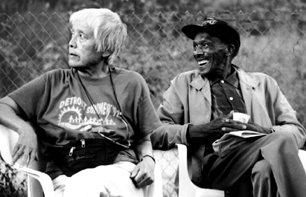I couldn't help but wonder, would we use, and glorify the same term "go for broke" to describe Black soldiers in the US who fought in the Civil War, WW2, Vietnam War, and today's Iraq War? Would we also use those terms to describe the Latino immigrant soldiers who enlist in the US army to fight in Iraq for citizenship while their families are locked up in detention centers? The legacy of the Black Power and Chicano movements show us that white supremacy, embodied in the US state, preaches democracy worldwide for its foreign policy, but never practices it at home. Except for when its an inescapable compromise pushed by the people's wrath.
Are the only times we glorify subservience to the state, moments when resistance is not seen to be threatening anymore? Blacks or Latinos in this country could not glorify joining the army easily, because the attacks on their communities by white supremacy is still so glaring, so in your face. So why is it that for J.A community, reluctant subservience to the state is glorified, rather than critiqued?
I couldn't help but painfully notice the elements of "model minority" that went into the description of these Nisei veterans. In a speech by historian Eric Saul, "America at its Best," he points out "Japanese values" that have made Nisei veterans fighters for an unjust government. Nowhere does he talk about the proud legacy of No-No boys, those who resisted fighting in WW2 for a government who only used democracy as a rhetoric, cos those Japanese Am at the time sure weren't seeing any democracy happening in the US!
Here's a quote from the piece:
Furthermore, your President, on February 19, 1942, signed an Executive Order that said you weren't Americans anymore, you were "non-aliens." So why did you join the army? Why did you become soldiers, and ironically become, of all things, the most decorated army unit that this country has ever produced?I mean, for real...this sounds all rosy and great..but I bet that most of the Nisei who went to fight at that time were mad confused and didnt know what else to do...worried for their own parents' safety if they didnt go to fight, worried for themselves too! For all the talk about Niseis "volunteering" to go fight in the war, the fact is that the repercussion for not fighting in the war was imprisonment in the state pen. Its bad enough that folks were forced to go fight in the war, but its even worse still that its made to seem like a choice when really, there wasnt any...There's nothing beautiful or great about forcing a group of oppressed people to fight a dirty war for the US...subservience to the white supremacist US state was never in anybody's blood, anybody's culture whatsoever. I resent the way that proud cultural traditions that have been used for people's liberation struggles are now being twisted in a pretty perverted manner to glorify subservience and non-resistance...
There were words like girl and on, which your parents taught you, which means "duty," and "honor," and "responsibility." You had to pay back your debt to your country.
Oyakoko: love for family. Your parents couldn't become citizens, but you loved your families and you had to . prove your loyalty at any cost. You used your bodies as hostages for your families to prove your love for democracy and justice when you volunteered from those camps.
[...]
Enryo: humility. There's an old Japanese proverb that says if you do something really good and you don't talk about it, it must be really, really good! You never talked about your wartime_ record. You didn't tell your children, you didn't tell your wives, and you didn't even tell the country.
Gaman: internal fortitude, keep your troubles to yourself. Don't show how you're hurting.
[...]
Haji: don't bring shame on your family. When you go off to war, fight for your country, return if you can, but die if you must.
[...]
People usually pit the US coalition of Allied forces, against the Japanese Empire during WW2, saying the former is the lesser of two evils. I find that hard to believe, considering that General McArthur was intending to drop a kazillion atomic bombs in North Korea soon after the Japanese War had ended. There wasn't no democratic ideal in resisting the Japanese...it was all a malevolent, practical political calculation. One area that I am really curious about, is the history of anti-war, anti-imperial resistance within Japan itself before and during the war period. While the rest of the Asian world was celebrating Japan's victory over Russia, for redeeming their sense of Asian dignity and pride, Japanese anarchists and socialists were fighting Japanese militarism within Japan itself. They were consistently for the solidarity of the international working class, not for allying with any specific nation's ruling elite.
There's a lot to be covered. But for now, here's a link to an article by John Crump that is pretty eye-opening: Anarchist Opposition to Japanese Militarism, 1926-37





1 comment:
Yes, you are absolutely right. Glorification of any war always serves fascist agenda. Glorification of the WWII has been a particularly menacing example and appears so persuasive simply because those who won the war are abusing the world right now. Your article reminds me of a Howard Zinn's speech I heard on Alternative Radio several years ago, in which he quotes his student:
"Wars are treated like wines: there are good years and bad years, and World War II was the vintage year. But wars are not like wines. They are more like cyanide; one sip and you're dead."
So,if it's indeed so challenging for many people to differentiate the two, why don't we just understand war glorification as cyanide intoxication? It's extremely dangerous, but hopefully not incurable.
Post a Comment